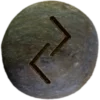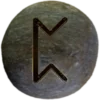Last Updated on December 22, 2024
Table of Contents


Andhrímnir (pronounced “AHND-hrim-neer”) is the legendary cook of Valhalla in Norse mythology ![]() . His name means “sooty-faced one,” referring to his role in preparing food for Odin’s Einherjar, the chosen warriors who train and feast in preparation for Ragnarök. He is mentioned in the Grímnismál of the Poetic Edda, where his task is described as cooking the boar Saehrímnir in the cauldron Eldhrímnir (pronounced “ELD-hrim-neer”). Every evening, he roasts the boar to feed the warriors, and every morning, Saehrímnir is miraculously restored to life.
. His name means “sooty-faced one,” referring to his role in preparing food for Odin’s Einherjar, the chosen warriors who train and feast in preparation for Ragnarök. He is mentioned in the Grímnismál of the Poetic Edda, where his task is described as cooking the boar Saehrímnir in the cauldron Eldhrímnir (pronounced “ELD-hrim-neer”). Every evening, he roasts the boar to feed the warriors, and every morning, Saehrímnir is miraculously restored to life.
This act symbolizes endless provision and renewal, reinforcing the cyclical nature of existence celebrated in Norse stories. Andhrímnir’s dedication ensures the warriors remain nourished for battle while fostering camaraderie during their nightly feasts. His cauldron, Eldhrímnir, holds a central role in the myth, representing abundance and the shared effort required to maintain community life.
The imagery of Andhrímnir tirelessly cooking each evening speaks to perseverance and fulfilling one’s duty, no matter how repetitive or challenging. His work emphasizes the importance of sustenance, not just of the body but also of the spirit. Although not as prominent as other figures in Norse mythology, Andhrímnir holds a vital place in the mythological cycle, demonstrating the significance of humble yet essential roles in larger narratives.
Two Elder Futhark Runes Associated with Andhrímnir
The rune Jēra (pronounced “YER-ah”), meaning “year” or “harvest,” aligns with Andhrímnir’s role in sustaining Valhalla’s warriors. Jēra signifies cycles, renewal, and rewards for effort, echoing the boar’s daily resurrection.
The rune Gebō (pronounced “GHEB-oh”), meaning “gift,” symbolizes the meal Andhrímnir provides to the Einherjar. Gebō represents giving and the reciprocity inherent in community and shared resources. Both Elder Futhark runes reflect Andhrímnir’s contributions to sustaining life and camaraderie. ![]()
Importance to Asatruar
Andhrímnir embodies devotion, community, and the value of simple acts that sustain life. His labor connects Asatruar to Norse values of perseverance and mutual support. In feeding Valhalla’s warriors, Andhrímnir reminds Asatruar of the importance of communal effort and honoring those who provide for others. The mythology surrounding him serves as a lesson in humility and the strength derived from shared meals and fellowship. For modern practitioners, Andhrímnir represents dedication to duty and the importance of sustaining one’s community.

